
By Francesco Bianchini
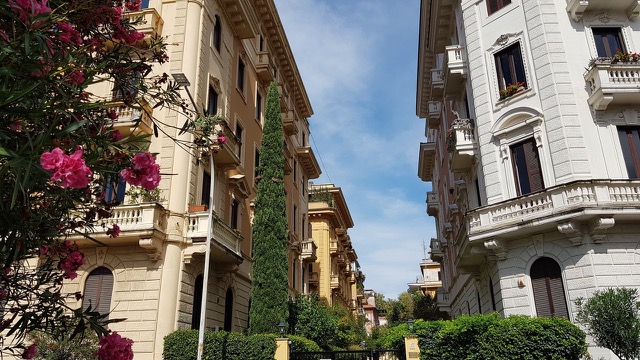
Via Francesco Siacci, in the Parioli neighbourhood of Rome
A sunny side of my childhood included visits in Rome to my nonna Margherita’s apartment, my father’s mother. Widowed at the age of thirty-two and never remarried, she’d evidently renounced all earthly sweetness because I don’t remember ever hearing her talk about the pleasure of a good table, only scolding us for our tantrums at meals. Not only did we have to eat everything, but we had to swallow mouthfuls of leathery meat furrowed with tendons; to endure the sight of boiled tongue, or the smell of underdone lamb, without making a sound. Born in the north of Italy, she was accustomed to a cuisine subservient to French culinary art – of risotto with butter, frog legs cooked in milk – and she admonished us constantly, reminding of how she had to get used to the olive oil of central Italy that had made her sick. We did not go to that grandmother’s Roman apartment to eat delicacies she never cooked (even if for us tortellini with cream from the tavola calda near her house, or chicken from a local rotisserie were something we found delicious and exotic) but to enjoy the pleasures of the big city; to scamper up and down on her building’s magnificent wooden elevator, for example. Her concierge, warned in time of the arrival of the country children, tolerated us snootily.
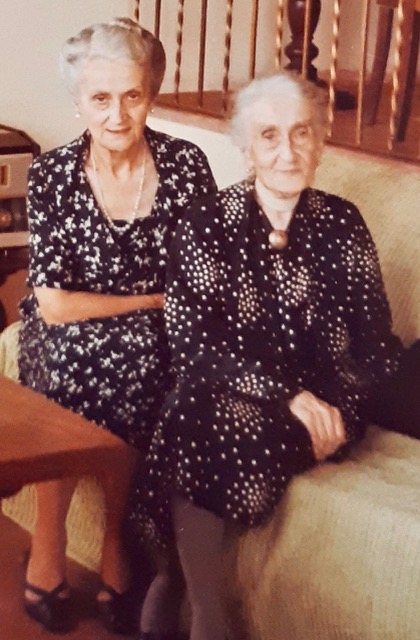
Grandmother Margherita and ’nonnina’ at the time of my visits to their apartments
As I left the hills of Sabina and the profile of Mount Soratte behind, and the highway descended onto the Latium plain bristling with high voltage pylons, I had the impression of entering another dimension, an Elsewhere which bore no resemblance to my small world. Grandmother Margherita’s apartment awaited with the scents that I cherished: aromas wafting from the neighbourhood – from the coffee roaster, the rotisserie on the corner, faded oleanders, the exhaust of the number 26 bus sputtering up toward Piazza Pitagora. And those of the foyer of her respectable building – of the well-tended plants, polished marble, spicy wood of the elevator car. Grandmother rented the place from her unmarried sister, Matilde, who lived on the same landing with their mother and the maid from the north of Italy. Together, the two apartments represented an enclave of Piemonte firmly rooted in the metropolis; a different linguistic universe – that northern Italian patois which I associated to how grandes dames expressed themselves, sometimes squeezing their vowels, sometimes spreading them out and hissing the consonants all over the place. We would wander from one apartment to the other, but always phoned first; so considerate, I thought, who lived in a house where everyone barged into each other’s rooms without ever knocking.
Both apartments were quiet as tombs because carpets and runners were laid everywhere, muffling the creaking of wax-scented parquet floors. Both were furnished in almost the same way and imbued with similar smells: velvet curtains that screened the corridors and vaguely hinted of tobacco; vases of dried flowers, pearly flickers of Pampas grass, and lunaria they call ‘the Pope’s medals’ at home, all shedding the stale bouquet of potpourri; light-colored wooden furniture with a fragile and coquettish appearance, and clouded mirrors adorning the walls in which you couldn’t even see yourself. Never the strong aromas that emanated from our country kitchen, but just the suspicion that, from time to time, my aunt and grannies fed on rice dishes, white meats drenched in buttery sauces.
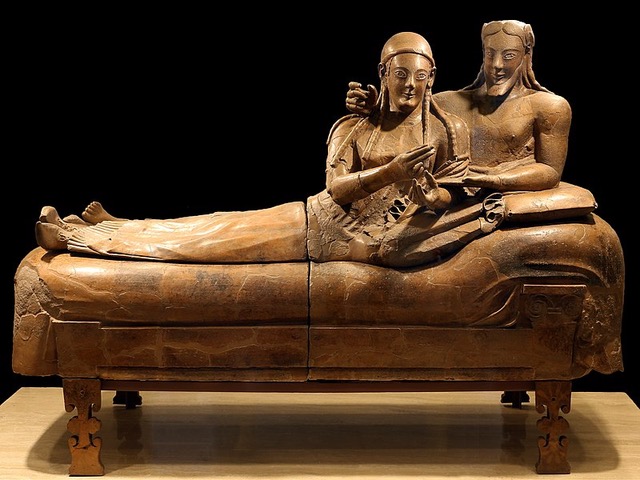
I could not help picturing my French grandparents as the Etruscan couple from the Villa Giulia museum in Rome
In Margherita’s rooms there was also the spicy fragrance of her Mah Jong chest, the tiles of which I loved to arrange on the table, and – who knows why – which also permeated her long silk lamp wires that granny enjoyed weaving with macramé stitches. In Rome, nonna forgot the bit of sloppiness and fretfulness she reserved for stays at our house. She wore gloves and a hat to go out, and took me for walks around Villa Borghese, to the cinema in Piazza Ungheria, for endless trips to the Vatican museums, and to the zoo where I always dragged her to the reptile house. In front of the display cases I shrank in revulsion, but to my grandmother who had ridden like an amazon, traveled through the capitals of Europe, and climbed Mount Rosa, snakes – even the extremely poisonous ones – matched her sang froid.
My great-grandmother Anna Poma – whom we called nonnina, the diminutive of nonna, not so much to cosset her but because old age had shriveled her in every possible way – seemed to speak to me from a past century, like those recordings preserved from the dawn of phonography. Her voice was a garrulous Piedmontese, chock-full of French words, halfway between the warble of a parakeet and the chinking of incomparably thin and slightly chipped porcelain. I remember her wrapped in gray or black sweaters studded with jet beadwork, a black silk ribbon around her neck, always hung with a small cameo. Like a child in a doll’s house, nonnina showed me the surprising things that cluttered the shelves and dresser of her room: fans speckled with glitter, music boxes, and jeweled caskets of all shapes. I looked at the framed photos as one looks at amazing Byzantine icons. Great-grandma had inhabited fantastic eras and sported immense hats that the ladies took off only to lie down and with which they barely walked through doors. After asking me the same question two or three times, granny would produce a silver bowl full of Leone’s famous licorice candies, flavored with violet, that she called sénateur. I thought, child that I was, that the name implied something about a sanitarium, perhaps because granny was keeping herself alive through imbibing elixirs and myriad camphorated concoctions. It was only much later that I discovered that the violet-flavored candy made by Luigi Leone, confectioner of Turin, was so appreciated by Cavour and his colleagues in parliament that they bestowed the name sénateur. In short, those candies were the icing on the cake; a cake of many delicacies and exoticisms that dotted my every stay with my grandmothers and aunt in Rome. Those round flattened tablets of brown opaque lacquer, scented with flowers and alpine breezes, crystallized the essence of their small antique world; of its salon rituals, of the fragrances with which they and their things were imbued.
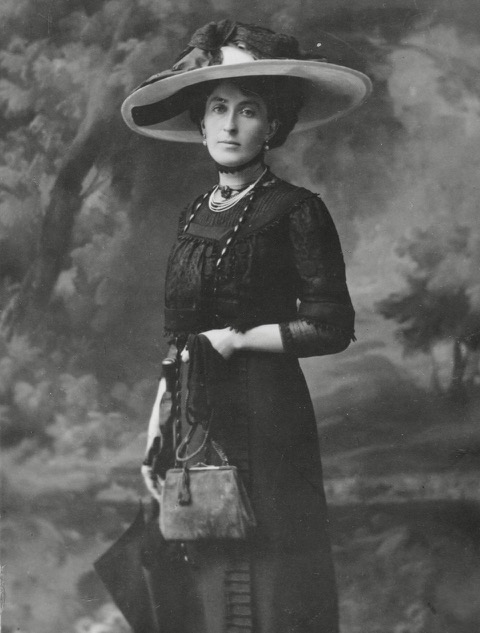
Anna Poma, hat and all, circa 1910
As I grew, I continued to haunt Rome alternating between the ladies. But in fact I preferred to stay with aunt Matilde who, though lacking common sense, told anecdotes galore about people who amused her, and spoke to me without the usual condescension of adults. We loved to discuss travel and literature, and she was my guide to the museums and galleries of Rome. I remember her invariably dressed in a pleated plaid skirt clasped by an oversize pin. The family kept a discreet eye on her, believing that as a spinster – lonely and temperamentally inclined toward the ethers of mind and spirit – she was unreliable and even, perhaps, a hazard to herself. It is true that she sometimes did strange things: scalding her face while having a suffusion or locking herself out of her house. In her kitchen, she would yammer on about some artist while stirring something in a saucepan until she awoke as from a daze and announced that she’d instead order two portions of cannelloni al forno, perhaps some supplì, to be delivered from the diner at the Euclide bar. After dinner, she’d usually light a cigarette and pour herself a little whisky, which she’d nurse forever. She had stacks of old LP records to entertain passing nieces and nephews, and once my era of Topo Gigio was over – an authentic cult object for her – she’d have me listen to the songs of Amalia Rodrigues, or to Chopin’s Etudes, provided they were interpreted by Alfred Cortot. She would sway around the apartment as if she were advancing on the deck of a ship, something that could perhaps have foreshadowed the Parkinson’s that took her from us prematurely.

Grandmother Anna in a rare portrait, around 1935
Staying with my French grandparents for a few days was a different kettle of fish. This grandmother, my nonna Anna, established rules of behavior, a list like Lent. Accustomed to the terracotta floors of our own house in Collevalenza, on which we were even allowed to ride our bicycles, we promised to go on tiptoe on nonna’s wax-perfumed parquet floors, and to respect the marble – polished to a mirror finish – of her apartment. You couldn’t enter grandpa Alexis’ study without knocking, and you had to be quiet during siesta times, a custom that had late become part of his routine; that is, since they had settled in Rome at the end of the 1950s. Everything in their apartment smelled differently than our house in Umbria. Instead of the smoke from fireplaces and stoves, that permeated our house in winter and summer alike, every room and object in their Roman place smelled of Madame Rochas. The bottle that grandmother kept in her bathroom had a label design reminiscent of the upholstery on some of her chairs, and I had the idea that that perfume was made especially for her, and that Madame Rochas was actually her name, but known only to a few intimates. There were many other things that surprised me in that apartment. For example, in my grandparents’ bedroom, the lit bateau had a traditional French traversin, a long cylindrical pillow, covered with a green satin bedspread, stretched out without making the slightest crease. How anyone could sleep comfortably on such a thing was a mystery to me, but my French grandparents were a rare species who would have jumped through hoops to conform to certain abstruse fancies – and I imagined them reclining on their sarcophagus, motionless, in the pose of the Etruscan married couple I had seen at a museum.
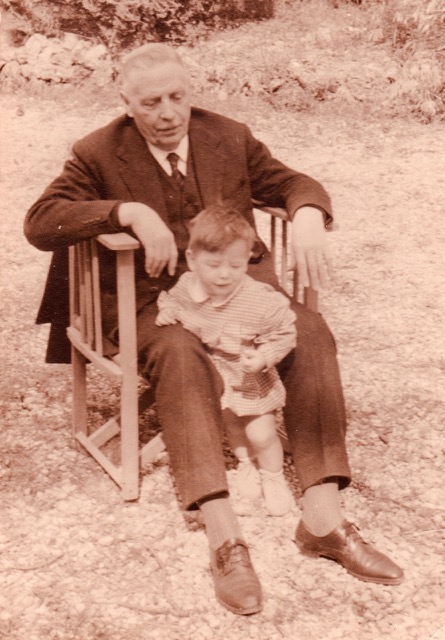
Grandfather Alexis and me
In their kitchen, with its furniture painted white like an infirmary, I usually had breakfast alone, since my grandparents skipped it, or had it at ungodly hours. Their maid would open one of those pyramid-shaped packages from Rome’s Centrale del Latte and seal it with a clothespin lest a drop ever spill on the gleaming kitchen marble. The buns, Roman rosettas, were hot from the baker’s shop and remain one of the most amazingly refined memories of all the things I ate there – especially when compared to our coarse Umbrian bread. I would first pluck off the central button, that released the tender, steaming smell of the dough, congealed inside to form almost transparent filaments that looked to me like Ali Baba’s cave when I put my eye to the hole. I then ate one lump at a time, crunchy nibbles from the golden crust until all that was left of the rosetta was a flour-dusted flat bottom. Nonna also kept packaged toast that I identified by the color of the wrappings: blue if tasteless, red if slightly sweet. And I associate with my Roman sojourns the bland flavor of their salad oil – never the dense green and viscous olive oil as our own in Umbria – and the pale apple vinegar they bought to dress their salads. I doubt that my French grandfather, originally from Burgundy, was ever able to adjust to the strong taste of Italian olive oil.
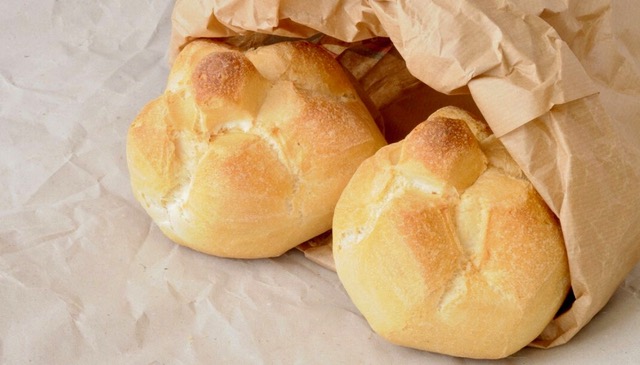
Freshly backed Roman ‘rosettas’






